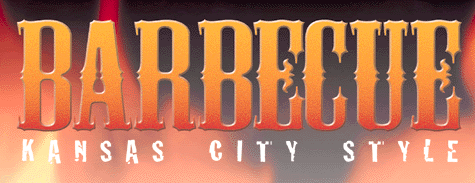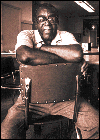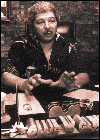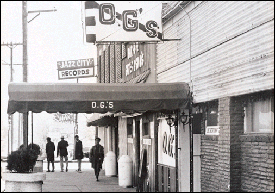True to tradition, barbecue here is dry rub-spiced, slow roasted hour after hour over a pit of hickory, and slathered up all around with some of the smoothest, richest, sweetly tangiest sauces in all the world. Thickest, too, for that matter. Traditional Carolina barbecue sauce consists of a mix of peppers in a bottl of vinegar. Traditional Texas sauce takes a tomato base, thins it with Worcestershire and vinegar, and adds a lot more hot peppers.
But Kansas City "took the best of both worlds," according to Rich Davis, by putting in Midwest tomatoes and coming up with "a sauce that doesn't fall off the meat into the fire." The result: a medium spicy, tomato-based sauce, "with molasses for character and body, not just sweetness." Davis founded KC Masterpiece Barbecue Products 20 years ago with a nationally marketed premium barbecue sauce. Today that sauce is a best seller. Davis is also the owner of the 10-year-old KC MASTERPIECE BARBECUE & GRILL, with two locations.
Historically, however, Kansas City's first recorded barbecuer was Henry Perry. Perry started working out of an old trolley barn at 19th & Highland and,
About the same time Arthur Bryant's got its start, Gates and a partner opened their own restaurant. Gates eventually took over the business completely and taught his son, Ollie, the tricks of the trade. In 1958, Ollie established his own
Another early influence here was Otis Boyd. One of the few founding fathers of Kansas City barbecue with formal training, Boyd attended a culinary school in Chicago before moving to Kansas City in the early 1940s. He established Boyd's Bar-B-Q soon after. BOYD 'N SON BARBECUE stands today at the original location at 5510 Prospect in Kansas City, Missouri. A decade earlier in 1934, Anthony Rieke and a brother-in-law opened ROSEDALE BARBECUE, now found not far from its original site at 600 Southwest Boulevard in Kansas City, Kansas. After failing as a produce farmer, Rieke
"Texas and the South met here," in the 1920s, local author/journalist Shifra Stein said, essentially turning the inner city into a melting pot of barbecue sauces, styles, and regional preferences. In a book Stein co-authored with Davis, "All About Bar-B-Q, Kansas City-Style," Stein notes the confluence of the different barbecue styles and people coming here for the jobs the Roaring '20s jazz scene created and catered to. For many of the migrants, according to Dr. Neal Willis, a professor of psychology at the University of Missouri-Kansas City, "cooking was their only marketable skill" - one of three main reasons for this area's unique, yet eclectic brand of barbecue.
Equally important, said Willis, was the availability of hardwoods. The entire area was forested in hickory, as well as oak, pecan, apple, and other flavoring woods. A barbecue match made in heaven occurred when the abundance of skill and wood came together with the ready supply and variety
But if you're not in town that weekend, don't despair. Calling barbecue, "the hottest thing going," Wells noted that there are dozens of contests held throughout the area, more, in fact, than any other similarly sized area in all the world. Couple that with the plethora of barbecue eateries in town and, no matter when you come or where you stay, you're bound to find Kansas City-style barbecue close at hand - if not running down your chin. |
|
BBQ BABBLE A slow process that requires attention to detail as well as patience, effective barbecuing requires a savvy barbecuer know his stuff. Here's a lesson in barbecue terminology for the novice: Baby Back Ribs (or Loin Back Ribs) - A cut of ribs from the pork loin, usually weighing around 2 pounds per slab. Barbecue - To slow cook meats over the heat of hardwood and/or charcoal at a temperature of 200 to 375 degrees. Barbecue Sauce - A liquid mixture, usually tomato-based, sweet and sour, with spices. Apply to meats during the final minutes of cooking. Can be served on the side as a dipping sauce or condiment. Burnt Ends - The blackened, somewhat charred pieces of brisket ends that cannot be sliced. A prized menu item from some area restaurants. Also referred to as "brownies." Glaze - A finishing sauce applied to meats during the final minutes of barbecuing. Long End Spare Ribs - The first six ribs from the breast bone on back. Marinade - A liquid mixture (usually an acid, oil, and spices) used to soak meats prior to cooking. Mop - A cotton mop used to baste meats while cooking. Pit - The cooking unit used to barbecue. May be a closed container, cement or brick structure, or even a hole dug in the ground. Rib Tips - The breast bone at the top of a slab of spare ribs. Rub - A dry marinade; a mixture of dry spices added to meats to impart flavor. Short End Spare Ribs - The last seven or eight ribs in a slab of spare ribs. Wood Chips - Small chips of wood, usually fruit wood or hard wood used to impart smoke flavor to barbecued meats. Soak in water before using. *Source: Kansas City Barbeque Society, copyright 1997 |


 by 1908, was serving up succulent slow-cooked ribs on pages of newsprint for 25 cents a slab. That old barn was the training ground for local barbecue legends like George Gates and Charlie Bryant. Bryant bought "Old Man Perry's" place and ran it with the help of his brother Arthur, later dubbed "King Arthur." When Charlie retired in 1946, Arthur replaced the wooden tables with Formica, covered the sawdust floor with linoleum, and tinkered with the sauce enough to earn the eatery the title of best restaurant in the world by columnist and Kansas City native Calvin Trillin. Famous faces such as Presidents Carter and Truman have visited ARTHUR BRYANT'S, long standing at 1727 Brooklyn in Kansas City, Missouri.
by 1908, was serving up succulent slow-cooked ribs on pages of newsprint for 25 cents a slab. That old barn was the training ground for local barbecue legends like George Gates and Charlie Bryant. Bryant bought "Old Man Perry's" place and ran it with the help of his brother Arthur, later dubbed "King Arthur." When Charlie retired in 1946, Arthur replaced the wooden tables with Formica, covered the sawdust floor with linoleum, and tinkered with the sauce enough to earn the eatery the title of best restaurant in the world by columnist and Kansas City native Calvin Trillin. Famous faces such as Presidents Carter and Truman have visited ARTHUR BRYANT'S, long standing at 1727 Brooklyn in Kansas City, Missouri.
 restaurant - GATES & SONS BAR-B-Q at 47th & Prospect in Kansas City, Missouri. Nearly 40 years later, Gates & Sons is the stuff of local lore with seven locations around town.
restaurant - GATES & SONS BAR-B-Q at 47th & Prospect in Kansas City, Missouri. Nearly 40 years later, Gates & Sons is the stuff of local lore with seven locations around town.
 made his mark in barbecue history with a thinner, hotter sauce more Southwestern in style than most of the other brands in town - a reflection of the geographic influences that converged on Kansas City.
made his mark in barbecue history with a thinner, hotter sauce more Southwestern in style than most of the other brands in town - a reflection of the geographic influences that converged on Kansas City.
 of meat from the Kansas City stockyards. Where the Carolinas concentrate on pork and Texas tends to beef, "here, if it moves, we cook it," according to Carolyn Wells, Executive Director of the Kansas City Barbeque Society, co-founded with her husband, Gary Wells, and Rich Welch in 1985. The society now claims 2,500 members in the United States and nine other countries. Many members compete in the American Royal's giant barbecue competition, held annually the first week in October.
of meat from the Kansas City stockyards. Where the Carolinas concentrate on pork and Texas tends to beef, "here, if it moves, we cook it," according to Carolyn Wells, Executive Director of the Kansas City Barbeque Society, co-founded with her husband, Gary Wells, and Rich Welch in 1985. The society now claims 2,500 members in the United States and nine other countries. Many members compete in the American Royal's giant barbecue competition, held annually the first week in October.